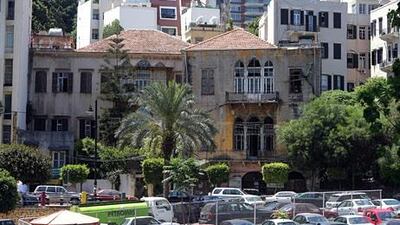In my building, there is one family with four cars and a few more that own two, even though each apartment is allocated one space. (The four-car family has two spaces because it lives in two apartments knocked through into one).
There is no specific rule as to who parks where and so the concierge keeps an extra set a of keys in case anyone's car is blocked. On Sunday, his day off, we are all very neighbourly - often in a bright array of pyjamas and leisurewear - and cheerfully move our own cars if anyone needs to get out.
The building was built in the early 1970s when it was assumed that one car was enough. It was a time, before the madness that was the civil war, a time when the Lebanese pound was virtually a hard currency, Beirut was the banking, healthcare and education hub of the Middle East and its national carrier, Middle East Airlines, was the pride of Arab aviation. In short, this was when we were a normal country.
During those 15 years of civil war madness we lost our ethical, social, moral - call it what you will - compass. Beirut's glut of new apartment buildings offers at least two, if not three, parking spaces to prospective buyers, because in today's Lebanon it's everyone for himself and to hell with the other guy. Nowhere is this attitude more apparent than in our obsession with insisting on driving everywhere. Car pooling? The bus? Forget it. When you stop to think about it, it's bonkers.
Now the demand for non-residential parking spaces has become so intense that the Jesuit Gardens, one of the capital's three green public spaces, a gift to Beirut from the religious order in the 1960s to be used as a space of quiet reflection, is in danger of being ripped up to create an underground car park. It is part of a project to build a new motorway that will cut a swathe of ugliness through Geitawi, one of Beirut's more charming residential neighbourhoods.
Understandably, local residents are furious, not only at what would be nothing short of a wanton act of urban vandalism but also at the fatuous promises by the Beirut municipality that the gardens would be rebuilt and replanted after the project, a process that would take about four years, is completed. Even if it did keep its word, it would take at least a 100 years to replace the giant shade-giving pine trees that have become part of the area's history.
But back to the obsession with driving. In the 20 years since the end of the civil war, there has been no genuine initiative to upgrade Lebanon's spluttering public transport system. In the heady days when the late prime minister Rafiq Hariri momentarily filled the country with a glimmer of optimism, the privately owned Lebanese Commuting Company was founded and indeed still runs buses across Beirut and to other destinations throughout the country. But any sheen, along with any conviction to maintain its fleet to any kind of reasonable standard, has disappeared with the nation's aversion to taking the bus.
About a decade a go I also decided to use the bus network, believing, maybe because I am at heart a Londoner, that a modern society has an obligation to use public transport. It was a short-lived exercise. The buses were filthy and the passengers wore a look of utter defeat. I was also convinced that I would drastically reduce my life expectancy by my proximity to the vehicle's belching fumes.
But improving and regulating our public transport is only half the battle in reducing traffic and emissions and creating a more inclusive society. The other half involves convincing the Lebanese to abandon their precious cars; to walk laptop case in hand to the bus stop and sit with their fellow citizens on the way to work, just like they do in all the major western cities whose inhabitants, habits and styles we try so hard to ape.
If we can do that, then the rest will fall into place and the people of Geitawi might just hang on to their garden.
Michael Karam is a Beirut-based freelance writer

Green space losing out to the obsession to drive everywhere
In Lebanon it's everyone for himself and to hell with the other guy. Nowhere is this attitude more apparent than in our obsession with insisting on driving everywhere.
Most popular today
